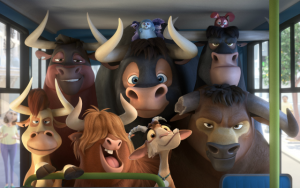Metro In Focus: The Story of Ferdinand — a bull market since 1936.
 By Richard Crouse – Metro In Focus
By Richard Crouse – Metro In Focus
One of the most enduring children’s tales of the 20th century was written in a single afternoon in 1936. Author Munro Leaf says it only took “25 minutes on a rainy Saturday” to pen The Story of Ferdinand, which he planned as a make-work project for his friend, illustrator Robert Lawson.
This weekend John Cena, Kate McKinnon and Bobby Canavale lend their voices to the animated Ferdinand.
The story about a big bull with an even bigger heart has been popular with readers for generations. In 1938 Life magazine raved, “Ferdinand is the greatest juvenile classic since Winnie the Pooh” and urged adults to “buy the book largely for their own pleasure and amusement.”
The success of the book took people by surprise, including Leaf’s widow who told Publisher’s Weekly, “What happened with Ferdinand is still a mystery. After Christmas, sales increased every week, and within 13 months, eight editions had been published. Ferdinand appeared as a giant balloon in the Macy’s Thanksgiving Day Parade; a Ferdinand song made the hit parade; and in December of 1938, The Story of Ferdinand nudged Gone with the Wind off the top of the bestseller lists.”
The book has never gone out of print and has been translated into more than 60 foreign languages, including a Latin version called Ferdinandus Taurus. Luminaries like H. G. Wells, Gandhi and Franklin Roosevelt approved of the book’s story of a bull that prefers smelling flowers to bullfighting and it was the only American children’s book available in Stalin-era Poland, but it wasn’t universally loved.
Released nine months before the outbreak of the Spanish Civil War, supporters of Francisco Franco thought it promoted dangerous pacifist ideas. As a result it was banned in Spain and remained so until 1975. Others suggested the book promoted fascism, anarchism and communism. The Cleveland Plain Dealer even ranted that the book was “corrupting the youth of America.” The New York Times, however, rejected the political metaphors, praising the book’s message of being true to oneself.
Adolf Hitler called it “degenerate democratic propaganda” and ordered all copies burned. In reaction, at the end of the Second World War, 30,000 copies were rushed into print and distributed to Germany’s children as a symbol of peace.
Walt Disney loved the story and commissioned a short film, Ferdinand the Bull, in 1938. In addition to producing the movie, Disney supplied the voice of Ferdinand’s mother and was the model for the Matador character. The short was a big hit, winning the Oscar for Best Short Subject. The film is particularly popular in Sweden where it has aired every Christmas Eve since 1959 as a segment on the annual Disney show Donald Duck and His Friends Wish You a Merry Christmas. In 1982 the Christmas tradition was broken when Ferdinand the Bull was replaced with The Ugly Duckling on the annual broadcast. The switch caused collective national Yuletide outrage and Ferdinand was returned to the show the next year where he has remained ever since.
No one is exactly sure why Ferdinand has had such a long-lasting impact, although one scholar suggests it’s because it crosses gender lines, offering up a character that appeals to boys and girls.
